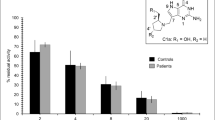Abstract
Lesch-Nyhan syndrome is neurological disorder caused by the complete deficiency of the purine salvage enzyme hypoxanthine phosphoribosyltransferase (HPRT) (1). Patients display spasticity, choreoathetosis, and aggressive, self-injurious behavior; megaloblastic anemia is also commonly associated with these patients. The connection between the enzyme defect and the symptoms is unknown, but the role of HPRT in purine production suggests a possible purine nucleotide deficiency. Metabolic therapies designed to correct this supposed deficiency, including adenine, ribose, inosine, and guanosine, have not been successful (1); however, none of these compounds has been demonstrated in vi tro to be capable of replacing hypoxanthine as a source of purine nucleotides. The compound 5-aminoimidazole-4-carboxamide ribonucleoside (AICAR) has been shown to produce quantities of adenine and guanine nucleotides in HPRT¯ cells equal to those produced by hypoxanthine in normal cells (2). AICAR is therefore theoretically capable of compensating cells for the lack of HPRT Based on this rationale, treatment of Lesch-Nyhan patient with AICAR was undertaken. Patient MS was a 16 year old classic Lesch-Nyhan patient with megaloblastic anemia (MCV 110) and megaloblastic bone marrow. He was given 30 mg/kg/day AICAR orally for four days followed by 100 mg/kg/day for four days, along with 400 mg/day allopurinol. AICAR, uric acid, and oxypurines were determined in the plasma and urine as described previously (3). No improvement was noted in his neurological, behavioral, or hematological status. Plasma AICAR remained <2 uM, and no changes in plasma uric acid or oxypurines were noted. Nor was any AICAR detected in the urine; urinary uric acid and oxypurines were also unchanged. These results are in agreement with the manufacturer’s estimate of <5% oral bioavailabi1ity of AICAR in humans.
Access this chapter
Tax calculation will be finalised at checkout
Purchases are for personal use only
Preview
Unable to display preview. Download preview PDF.
Similar content being viewed by others
References
Kelley, W.N., and Wyngaarden, J.B., 1983, Clinical syndromes associated with hypoxanthine-guanine phosphoribosyltransferase deficiency, in, “The Metabolic Basis of Inherited Disease,” J.B. Stanbury, J.B. Wyngaarden, D.S. Fredrickson, et al (eds), McGraw-Hill, New York.
Page, T., 1989, Purine nucleotide production in normal and HPRT¯; cells, Int. J. Biochem. 21: 1377.
Page, T. Bakay, B., Nissinen, E., and Nyhan, W.L., 1981. Hypoxanthine-guanine phosphoribosyltransferase variants: correlation of clinical phenotype with enzyme activity. J. Inher. Metab. Dis. 4: 203.
Author information
Authors and Affiliations
Editor information
Editors and Affiliations
Rights and permissions
Copyright information
© 1995 Springer Science+Business Media New York
About this chapter
Cite this chapter
Page, T., Barshop, B., Yu, A.L., Nyhan, W.L. (1995). Treatment of Lesch-Nyhan Syndrome with AICAR. In: Sahota, A., Taylor, M.W. (eds) Purine and Pyrimidine Metabolism in Man VIII. Advances in Experimental Medicine and Biology, vol 370. Springer, Boston, MA. https://doi.org/10.1007/978-1-4615-2584-4_76
Download citation
DOI: https://doi.org/10.1007/978-1-4615-2584-4_76
Publisher Name: Springer, Boston, MA
Print ISBN: 978-1-4613-6105-3
Online ISBN: 978-1-4615-2584-4
eBook Packages: Springer Book Archive




